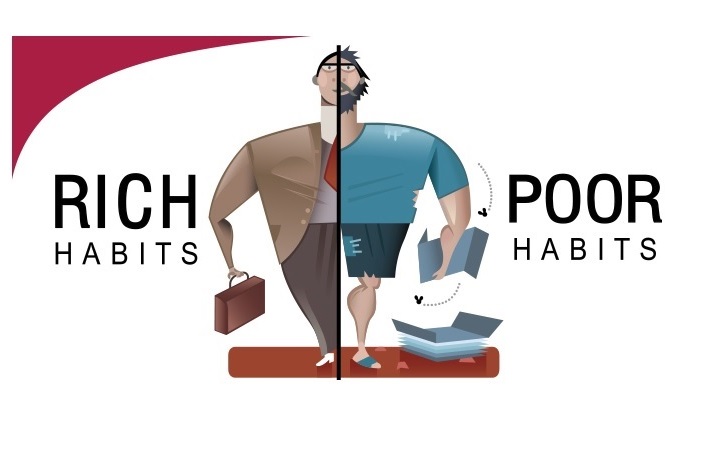 In my Rich Habits Study, 41% of the 233 self-made millionaires I interviewed came from poverty. Conversely, in my Poor Group (128 people), 66% of them came from poverty.
In my Rich Habits Study, 41% of the 233 self-made millionaires I interviewed came from poverty. Conversely, in my Poor Group (128 people), 66% of them came from poverty.
While those stats are revealing, they didn’t answer one question which has constantly plagued me –
Out of the entire population of poor people, how many actually become rich?
So I sought out some credible, third party data. In a 2013 Pew Charitable Trust Report on income mobility, I found the answer:
4%
Here’s some of the data from that Pew Report:
- Only 4% of the poor become rich.
- Only 17% of the poor rise to the middle-class.
- 70% of the poor remain poor.
Why is it so hard for poor people to break free from poverty and become rich?
If you listen to the experts, they would tell you that poverty is a very complex social issue with many moving parts, or factors, such as:
Exploitation by the Wealthy
The wealthy exploit the poor for their own gain. They do this, primarily, by supporting politicians who advance policies that favor the rich at the expense of the poor.
Unfair Taxation
The wealthy are able to maintain and grow their wealth through tax laws that favor the rich. Tax laws that favor the rich prevent a normal redistribution of wealth, causing an inequitable gap in wealth between the rich and the poor.
Exploitation by Wall Street’s Financial Institutions
Greed lead to the 2008 sub-prime debacle which nearly took down the world economy. Financial institutions exploited the poor by lower or ignoring their lending standards. As a result, many poor individuals borrowed money on their homes, which included small print provisions allowing financial institutions to dramatically increase interest rates.
Poor Education
Inadequate funding of public schools in poor communities means the poor receive a sub-par education, putting them at a disadvantage in society.
Crony Capitalism
Government and big business collude to benefit one another and the poor become pawns in the games they play.
Discrimination
The rich, Wall Street, banks, financial institutions, government and others in society discriminate against the poor.
Lack of Opportunity
There is an inherent lack of opportunity in poor communities due to inadequate investment in those communities by the wealthy, Wall Street, banks, financial institutions businesses and government.
All of these factors do contribute to poverty. There is no question about it.
But none of these factors actually addresses the fundamental cause of poverty, which is:
Poor people stay poor because they learned how to be poor from their parents.
What exactly do children born into poverty, learn from their parents that keeps them poor?
- Poor children pick up certain bad habits from their parents, that create poverty. Examples:
- Watching too much TV, YouTube, wasting time on Facebook and other social media sites.
- Not reading every day to increase your knowledge.
- Spending 100% of your earnings.
- Living beyond your means.
- Accumulating debt.
- Poor children pick up certain negative thinking and negative emotions from their parents, that create poverty. Examples:
- Pessimism.
- Doubt.
- Negative mindset.
- Hopeless mindset.
- Anger.
- Victim mindset.
- Persecution mindset.
- Poor children pick up various negative, limiting beliefs from their parents that create poverty. Examples:
- It’s impossible to break out of poverty.
- The rich are evil and greedy.
- Poor people can never become rich.
- Rich people have good luck and poor people have bad luck.
- Money is the root of all evil.
- Rich people are crooks.
- We’re poor because it’s God’s will.
- God loves the poor.
A big part of success is knowing what to do, how to think, what to believe and what not to do, how not to think and what not to believe.
And the first, or only mentors to teach these things are typically parents.
If parents, however, don’t know what to do and what not to do, that puts you behind the eight ball.
If your parents unintentionally teach you habits that contribute to poverty, that puts you behind the eight ball.
If your parents are not around to mentor you, that puts you behind the eight ball.
If your parents are addicted to drugs or alcohol, that puts you behind the eight ball.
While poverty might begin at home, it doesn’t have to end there. What kids lack, what their parents lack, and what their teachers lack is knowledge. They don’t know what they don’t know.
And what exactly is it, they don’t know?
They don’t know which habits, thinking and beliefs make you rich and which habits, thinking and beliefs keep you poor.
In my books, Rich Habits, Rich Kids, Change Your Habits Change Your Life and Rich Habits Poor Habits I listed many of the habitual behaviors, habitual choices, habitual thinking and learned beliefs that the rich and the poor inherited from their parents in their upbringing. The differences are quite startling and numerous – In my five-year study I tracked over 300 differences in the habits, thinking and beliefs that separate the rich and poor.
Habits, thinking and beliefs, I learned, are the reasons why you are rich, poor or stuck in the middle-class.
The good news is habits, thinking and beliefs can all be changed. The bad news is you must know which habits, thinking and beliefs lift you up and which drag you down.
Only through knowledge can one unbind the chains of poverty.
If you’d like to find the Pew Charitable Trust report, you can locate it here.

Tom Corley is an accountant, financial planner, public speaker, and author of the books “Effort-Less Wealth: Smart Money Habits At Every Stage of Your Life” and “RichKids: How to Raise Our Children to Be Happy and Successful in Life“. Corley’s work has appeared on CNN, USA Today, The Huffington Post, SUCCESS Magazine, and many other media outlets and podcasts in the U.S. and 27 other countries. Tom is a frequent contributor to Business Insider and CNBC.
Comments